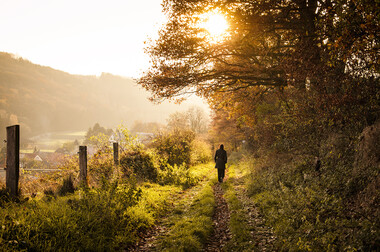
Those affected feel listless and listless in the dark season. This is mainly due to the lack of light, emphasises Natura Vitalis founder Frank Felte.
Winter depression regularly occurs in the dark season and puts those affected into a seasonal low mood. Above all, a lack of light seems to be responsible for this temporary and recurring depression. However, other factors such as disturbed metabolic processes and a negative inner attitude towards winter are also attributed a certain importance. In most cases, (natural) light therapy, St. John's wort, plenty of exercise in the fresh air and other home remedies help to counteract and prevent the symptoms.
"Many people feel mood swings that vary with the weather and season. However, this is not the same as depression. We only speak of winter depression when symptoms that can be classified as typical depressive symptoms only occur during the dark season. With the winter blues, these signs are generally less pronounced," says Natura Vitalis founder Frank Felte (www.naturavitalis.de). The company from Essen has long been considered one of the leading manufacturers of natural food supplements and places the highest value on continuous further and new developments of health products on a scientific basis.
In contrast to the general clinical picture of depression, winter depression is not accompanied by the usual difficulties in falling asleep or sleeping through the night, but rather by a noticeably increased need for sleep. As a rule, however, longer periods of sleep are not restful. On the contrary, those affected feel tired and exhausted during the day. Loss of appetite and weight loss are also less common, but there is an increased need for food intake with cravings for carbohydrates and sweet foods. This often leads to weight gain, warns Frank Felte.
Other signs are listlessness, fatigue during the day, poor concentration and performance, social withdrawal and other moods, which can be accompanied by worry, anxiety and irritability. In addition to the psychological signs, there are also regularly physical effects. Those affected often experience complaints such as headaches, breathing problems, heartaches, digestive problems or muscle tension.
But why is that? "The lack of light in the period from November to February is primarily held responsible for the development of winter depression, which is said to affect the brain metabolism. The pineal gland, which is located above the midbrain, is sensitive to light-dark stimuli and reacts by releasing the hormone melatonin. An increased melatonin level has a limiting effect on attention and influences the release of other hormones," emphasises Frank Felte.
In addition, the lack of light causes an imbalance in the household of neurotransmitters. A deficiency of the "feel-good hormone" serotonin is said to play a special role here. The exact correlations, however, are still the subject of scientific research. In many cases, natural treatment methods and home remedies help those affected. These include, for example, natural cannabidiol (CBD), the healthy part of the cannabis plant. This has proven its effectiveness in combating winter depression, Frank Felte points out. Natura Vitalis relies on the combination of high-quality cannabis sativa extract, vitamin C and vitamin B6 and the other natural vital substances manganese, zinc and folic acid to provide relief. "This power formula contributes to normal mental function as well as normal functioning of the nervous system, reduces tiredness and fatigue and helps regulate hormone activity, which is also important for our sense of well-being."
This text may contain translation errors as the translation was done by
an online translation tool.










